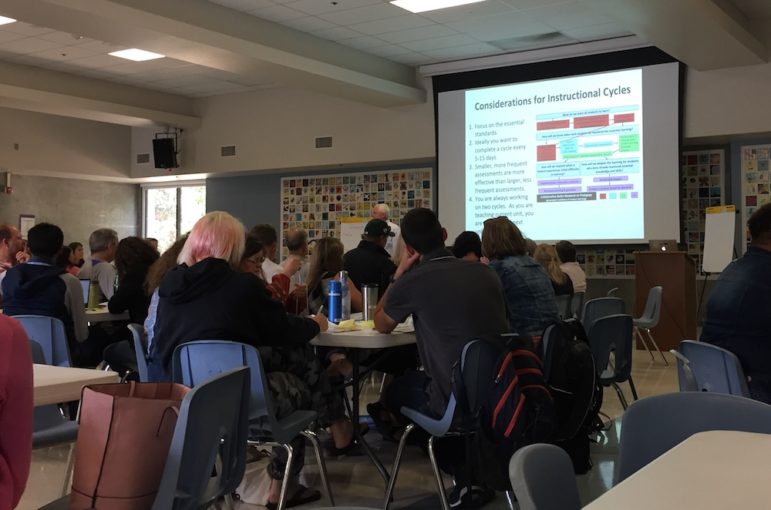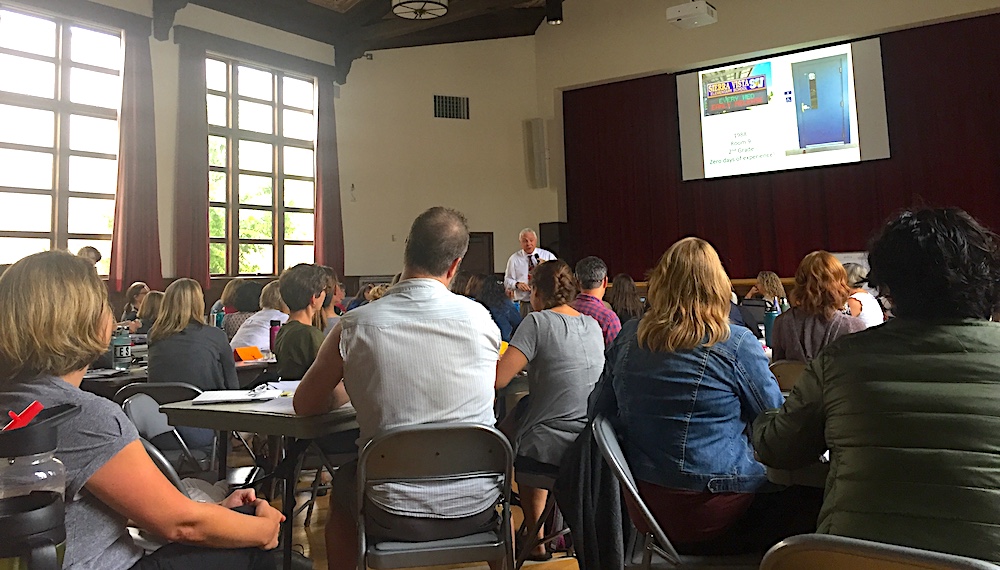Students are now in school but just a few days before the first day, teachers and staff were in class themselves. The annual Professional Development (PD) Day was held over the course of two days on August 8-9 for everyone at the secondary and elementary levels, respectively.
Heading the workshops was Solution Tree’s Jon Yost, who integrated “Professional Learning Communities” (PLCs) with PUSD’s two missions of the new school year: Interdependency and “All Means All.”
Solution Tree is an Indiana-based professional development company and educational material publisher. This was the first year that PUSD has collaborated with Solution Tree for developmental support.
“We have faith in our students, not necessarily who they are this moment, but what they can become,” said Superintendent Randy Booker about PD Day at the School Board meeting last Wednesday. “But we can only do this work when we’re interdependent on each other.”
According to Yost, PUSD has been on a journey of bringing PLCs to the District. Solution Tree was contacted and after being matched with PUSD, Yost met with Assistant Superintendent Cheryl Wozniak.
“It actually started with Mr. Booker’s message from the very beginning,” said Yost.
“This is not about a test score. It’s not about [public perception]. What [Piedmont Unified wants] is all kids to be successful in life.”
Jon Yost (from Solution Tree), keynote presenter for PUSD’s professional development day
The three big ideas of PLCs are: accepting learning as the fundamental purpose and willing to examine all practices, commitment to working together to achieve collective purpose through the development of high-performing teams and assessing effectiveness on the basis of results rather than intentions.
Aaron Barlin, one of PHS’ newest English teachers, attended Thursday’s PD Day. He said the biggest takeaway was that PLCs aren’t just teams, they’re a community.
“That was an interesting takeaway, given that this is a really small district and it’s easier to have an actual PLC that involves the entire community,” remarked Barlin.
“[So] how do we make a Professional Learning Community real?” asked Barlin.
The outcomes of the PD Day were hopes that teachers and staff would:
- Understand and be able to articulate what it means to be a professional learning community (PLC)
- Learn how to use multiple tools to drive the work of collaborate teams centered around the four critical questions (What is it we want our students to know and be able to do? How will we know if each student has learned it? How will we respond when some students do not learn it? How will we extend the learning for students who have demonstrated proficiency?)
- Deepen their understanding and ability to utilize formative assessments to increase student learning
- Improve their ability to utilize evidence of student learning to increase their instructional effectiveness
Yost stated that teachers must work as teams in order to “retool” schools. This means changing the way they were traditionally set up where teachers worked in isolation.
When he asked secondary teachers and staff on Thursday about their understanding of PLCs, the answers he received included: “circle of inquiry,” “examining our current reality” and “identifying the highest leverage area we need to improve upon.”

For true collaboration to happen, Solution Tree requires “a group of teachers who meet regularly to share, refine, and assess the impact of lessons and strategies continuously.”
“When we say a school is going to operate as a professional learning community, what we’re saying is we’re going to be engaged in learning together,” Yost said. “We should break down the walls of isolation together and put those best practices into action.”
The packet stated that fundamental assumptions held about students are that:
- All students don’t learn the same way
- All students don’t learn at the same speed, some students lack prior skills and knowledge
- Some students lack academic behaviors
- Some students have a home life that is counterproductive to academic success
Genesis Berrios, who has been a special education paraeducator for PUSD for more than five years, attended Friday’s PD Day. Despite having attended many PD Days, she acknowledged that the District tries to make each year unique.
“In terms of professional development, it’s always just a great way for a lot of our staff to come together to get inspired all over again,” said Berrios. “Every fall it gives you a new outlook and a new vision for the year.”
Interdependency – OUR students, not MY students
During both PD Days, Yost expanded on the term “team” by using educational researcher Richard Dufour’s definition as: “working interdependently to achieve a common goal for which members of the team are mutually accountable.” What this means is referring to students as “our” students versus “my” students.
“We’re definitely going to try to have this shift of ‘Just because a student is in one particular class, that doesn’t mean it’s just that teacher’s student,’” recalled Berrios. “All of our students belong to all of us and we all have the accountability for the students’ learning experience.”
“Piedmont notices this is the right work and they are searching for how to make this happen,” said Yost. “I think what they’re grappling with is how to do this work and how fast they can learn to transform how they work together and what they do for kids.”
